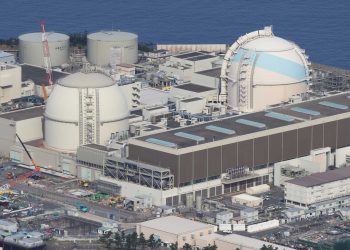,
The UN Security Council led the way in condemning North Korea's first nuclear weapons test, which sent a shudder round the world and triggered calls for a tough response.
US President George W. Bush branded the test a threat to international peace and security.
The Security Council strongly condemned it as in defiance of a UN resolution and vowed a strong and swift response.
Japan's UN envoy Kenzo Oshima, the current council president, read out a statement urging North Korea “to refrain from further testing” and return to six-nation disarmament talks.
A host of countries led by the United States, Japan and Britain called for stern UN action, South Korea warned it may end its policy of engagement with the secretive regime, and China — Pyongyang's closest ally — condemned the test as “brazen.”
However North Korea's ambassador to the United Nations said the isolated state should be congratulated for its first nuclear test instead of being condemned by the international community.
“It is better for the Security Council of the United Nations to congratulate the DPRK (North Korean) scientists and researchers,” instead of pursuing a “reckless resolution” against Pyongyang, ambassador Pak Gil-Yon told CNN television.
In Seoul activists burned North Korean leader Kim Jong-Il's portrait. Stock markets across Asia fell on worries of a regional nuclear arms race.
“Once again North Korea has defied the will of the international community, and the international community will respond,” Bush said.
Bush and Russian President Vladimir Putin stressed the need for a coordinated response to the nuclear test, the Kremlin said.
The presidents agreed by telephone that North Korea's test had “caused damage to the non-proliferation regime, and they remarked on the need for coordination of actions with the aim of resolving the problem,” a Kremlin statement said.
Russia, one of the six nations — with the two Koreas, China, Japan and the United States — involved in stalled talks on curbing Pyongyang's nuclear ambitions, urged North Korea to return to negotiations.
Putin said the test had caused “huge damage” to efforts to restrict the spread of weapons of mass destruction.
Bush said that he had discussed the crisis with the leaders of China, South Korea, Russia and Japan.
“We reaffirmed our commitment to a nuclear-free Korean peninsula. And all of us agreed that the proclaimed actions taken by North Korea are unacceptable and deserve an immediate response by the United Nations Security Council,” he said.
China was one of the first nations to condemn the test, urging North Korea to “stop all actions that can lead to the deterioration of the situation” but also calling on the international community to respond calmly.
South Korean politicians denounced the test, with the main opposition party saying it is tantamount to a declaration of war.
The ruling Uri Party said the North should take “full responsibility for committing such a foolish act despite repeated warnings from the international community.”
Opposition parties demanded the cabinet quit, saying the “provocative move” showed Seoul's policy of appeasing the communist state was misguided.
They also called for a tough response, including an immediate halt to all types of aid to North Korea, Yonhap news agency reported.
The main opposition Grand National Party (GNP), said even humanitarian aid to the poverty-stricken communist country should be cut off.
The next UN Secretary-General, South Korea's Foreign Minister Ban Ki-Moon, said the test had soured what should have been a moment of joy for him.
He was speaking shortly after the Security Council nominated him to succeed Kofi Annan.
He described the test as a “grave and direct threat to peace and stability on the Korean peninsula and in Northeast Asia.”
The Seoul government “will be firm and resolute in adhering to the principle of no tolerance for a nuclear North Korea.”
The current UN Secretary-General, Kofi Annan, expressed deep concern, saying the test would aggravate tensions on the divided Korean peninsula.
Japanese Prime Minister Shinzo Abe called for a stern international response, saying North Korea's nuclear test would lead Tokyo and Washington to step up work on missile defense.
Abe, who took office two weeks ago after a career built on campaigning against North Korea, said he found support in both South Korea and China for a tough line on Pyongyang.
“We need to make a stern response and North Korea will be responsible for all the consequences,” Abe told reporters after talks with South Korean President Roo Moo-Hyun.
Japan is particularly sensitive as North Korea fired a missile over its main island in 1998. The two countries have tense relations and have never established diplomatic relations.
The test, if confirmed, would represent a grave threat to world security, UN atomic agency chief Mohamed ElBaradei said in Vienna.
“This reported nuclear test threatens the nuclear non-proliferation regime and creates serious security challenges not only for the East Asian region but also for the international community,” said the International Atomic Energy Agency (IAEA) director general.
Britain is pushing for sanctions to be slapped on North Korea by the UN Security Council in response to its nuclear test, Foreign Secretary Margaret Beckett said.
“The United Kingdom will be pushing for a robust response under chapter seven” of the UN Charter, she said. “We shall be pushing for sanctions against North Korea”.
OSCE chairman Karel de Gucht said that the test was “a serious threat to regional and global stability” and “North Korea should immediately abandon its nuclear weapons programme and avoid any actions that would further heighten tension.”
The test was condemned throughout Europe with Austrian Foreign Minister Ursula Plassnik saying “North Korea should stop playing with fire and immediately return to the negotiating table.”
The test also received widespread condemnation from the ex-communist Eastern Europe with Latvian President Vike Vaira-Freiberga saying it was alarming.









